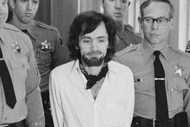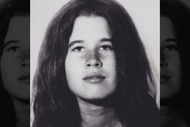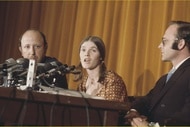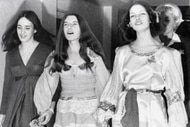Create a free profile to get unlimited access to exclusive videos, breaking news, sweepstakes, and more!
Were Charles Manson And The Beach Boys' Dennis Wilson Really Friends?
Hollywood historians are still puzzling over the strange relationship between the infamous cult leader and The Beach Boys' heartthrob drummer.

Many true crime fans know all too well the charismatic power that Charles Manson wielded over his disciples, but even accomplished artists such as The Beach Boys member Dennis Wilson were not immune to Manson's charms.
Manson is the subject of EPIX's new docuseries "Helter Skelter: An American Myth," which chronicles the cult leader's unsuccessful foray into the Hollywood music scene.
The rockstar first met Manson in spring of 1968, after Wilson had picked up two girls hitchhiking and brought them back to his home in the Pacific Palisades. According to the docuseries, the girls were Manson Family members Ella Jo Bailey and Patricia Krenwinkel, the later who would participate in the Tate-LaBianca murders a year later.
The girls lingered around the famous drummer’s mansion not long before Wilson returned home one evening to find Manson in his driveway. Fellow Beach Boy Mike Love writes in his 2016 memoir “Good Vibrations" that Manson knelt down and kissed Wilson’s feet upon their first meeting.
“I think the two must have hit it off,” former Manson girl Dianne Lake said in the EPIX docuseries. “Charlie was teaching Dennis how to play the guitar and Dennis welcomed Charlie and us girls into his home, and we would take his Rolls Royce and go dumpster diving.”
Another Manson girl, Catherine “Gypsy” Share, described the first time she met Manson at Wilson’s estate. Share told producers of "Helter Skelter" that Manson first approached her wearing what appeared to be a silk robe and matching harem pants, which she later discovered were fashioned out of Wilson's bedsheets.
Manson’s hippie lifestyle and socially conscious lyrics appealed to Wilson, who was interested in the grittier music of the era’s progressive rock scene.
“[Dennis’] music, the music he likes to write best, is really serious,” Wilson’s brother Carl Wilson told Rolling Stone in 1971. “He has the most nervous energy.”
Embracing the California counterculture even more than his bandmates, Wilson regularly invited Manson and his harem to perform for guests at his star-studded house parties. Music producers Gregg Jakobson and Terry Melcher were among the many celebrities who were introduced to Manson at Wilson’s home.
“Dennis used to call Charlie ‘The Wizard,’” Jakobson recalled in “Helter Skelter.” “He really thought that Charlie was magical.”
But while Wilson seemed to be enthralled with Manson’s musical talent, many of his guests were not so impressed.
“I just thought he was a seedy little character,” Johnny Echols, the lead guitarist of the band “Love,” said of Manson in the new docuseries. “The weirdest thing was, first the parties were in the guest house, and Manson and his crew would be there. And then it kind of flipped itself, and Dennis moved those people into his house, and he stayed in the guest house on his own property.”
Having formed their own record label, Brother Records, only a year prior, The Beach Boys were already looking to include new talent in their recording lineup by the time Manson had befriended Dennis Wilson in summer of 1968. That year, Dennis invited Manson to record a demo at his brother Brian Wilson’s in-home recording studio. That’s when the relationship began to sour.
A couple of Manson girls who tagged along took the opportunity to swim naked in Brian Wilson’s pool, much to the chagrin of Brian’s wife, Marilyn. Worse yet, Manson was an intractable recording artist with no experience performing in a studio, which incurred the wrath of The Beach Boys’ audio engineer Stephen Desper.
"Charlie was not going to be produced," Desper can be heard saying on a tape recording in the docuseries. "He had no idea what recording sessions were about or how to make records. He took it all very personally, and he was not a professional artist."
After an argument in the studio, Manson left Brian Wilson's home in a fit of frustration, empty handed.
That is not to say that Manson and his family did not reap more than their fair share of benefits while riding Wilson’s coattails. Plying Wilson with drugs, sex, and musical inspiration during their unofficial residency at his mansion, the Manson family helped themselves to the famous musician’s assets in kind.
A Rolling Stone interview with several members of The Beach Boys revealed that Wilson’s expenses from Manson included a $1,200 bill from the Altadena dairy company (costing about $9,000 in today’s currency) and a lofty sum in penicillin treatments to quell an outbreak of gonorrhea among members of the Family. Wilson estimated he spent about $100,000 (roughly $740,800 today) on gifts for the Manson family over the course of their brief friendship.
Running out of patience and generosity, Wilson began to distance himself from the parasitic Manson crew.
“He didn’t want people to take advantage of him — nobody does — and it became more and more apparent that that’s what was going on,” Jakobson observed of his close friend in the docuseries. “He said ‘Gregg, can you get me out of here?’ So literally I hired a moving company to take Dennis’ personal stuff out of there, and the whole idea was to not let the girls and Charlie know.”
Returning to the Family’s residence at Spahn Ranch without a record deal, Manson was even further vexed by the release of The Beach Boys’ song ‘Never Learn Not to Love,’ which was adapted from one of Manson’s songs ‘Cease to Exist.’ The BBC reported that Manson apparently signed over his rights to the writer's royalty in exchange for a one-off cash payment and a motorcycle, but the aspiring musician was incensed that Wilson decided to change some of the original lyrics.
After the song’s release in late 1968, Manson sent Wilson a single bullet with a threatening message attached.
"I gave [Wilson] a bullet because he changed the words to my song," Manson recalled in a 1993 interview with Diane Sawyer.
Afterwards, Wilson’s friend and fellow musician Van Dyke Parks claimed to have witnessed Wilson viciously assault Manson in response to the threat, according to The Guardian.
Wilson had officially cut ties with the Manson Family, but he was still apprehensive about their unpredictable behavior.
“Dennis was aware enough of what Charlie was capable of which was why he slept with a gun under his pillow,” journalist David Dalton said in “Helter Skelter.”
Evidently, Wilson’s fears were not unfounded. In August of 1969, Manson sent his followers to Benedict Canyon to the former home of Wilson’s friend and producer Terry Melcher.
"This residence — 10050 Cielo Drive — where Tate and Polanski now lived, came to symbolize the establishment to Charles Manson, particularly the establishment's rejection of him," Vincent Bugliosi, the lawyer who prosecuted the Manson Family, told The Guardian in 2009.
With Melcher no longer living there, members of the Manson Family instead killed actress Sharon Tate and her four houseguests that fateful evening.
After Manson and his followers were eventually apprehended for their crimes, Wilson seldom spoke about his involvement with the Family. In his 2016 memoir, bandmate Mike Love speculated that Wilson felt immense guilt for having introduced Manson to the Hollywood scene before the murders took place.
Manson was convicted in 1971 for his role in orchestrating the murders and sentenced to nine consecutive life sentences. Manson died in prison in California in 2017 at the age of 83.
Wilson, on the other hand, tried to continue his career while struggling with drug addiction and substance abuse. Rolling Stone reported that Wilson drowned at Los Angeles’ Marina Del Rey in December of 1983 at the age of 39, having gone diving while intoxicated.
Asked about his son’s relationship with Manson, Dennis’ father Murry Wilson told Rolling Stone, “I told my sons a long time ago: be careful who you choose as your friends.”
“Helter Skelter” airs Sundays at 10 p.m. on EPIX.


























